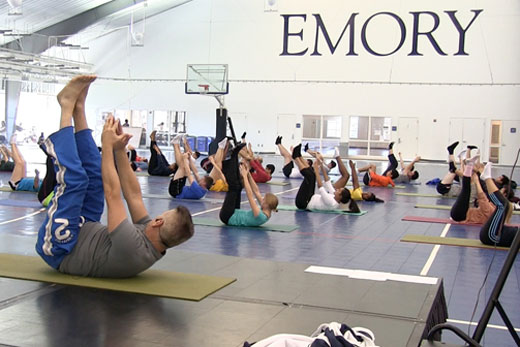Plans to offer a new Human Health major represent a natural step for Emory University, building upon a strong foundation in health-related studies to bring the science of health more fully into a liberal arts education, says Michelle Lampl, who directs Emory's Center for the Study of Human Health (CSHH).
In March, the Emory College of Arts and Sciences Curriculum Committee approved the development of an "innovative and interdisciplinary major in Human Health," to be offered through the CSHH.
"This major represents the very best of Emory College — path-breaking scholarship, an energetically interdisciplinary perspective, and innovative pedagogy," says Emory College Dean Robin Forman.
"Few notions are more central to the human experience than that of health, and this major will help solidify Emory's reputation as a leading college of Arts and Sciences for faculty and students with an interest in engaging in broad and rigorous exploration of this topic," he adds.
For Emory students, the new Human Health major will also offer the possibility of pursuing minors in popular existing programs, such as global health and predictive health, as well as other interdisciplinary curricula.
"Health is a top priority in the U.S. and the world today," says Lampl, Samuel Candler Dobbs Professor of Anthropology and a physician-scientist whose research explores human growth and development.
"We're trying to offer a liberal arts education with that in mind, (providing) an educational perspective that someone who will be a professional in the 21st century needs to have in their portfolio — from a research scientist to a policymaker, a music therapist to someone involved in pastoral care."
Evolution of a new major
The curriculum committee's approval marks an important first step in advancing the major. The plan must also now be endorsed by the Southern Association of Colleges and Schools (SACS) and Emory's Board of Trustees before it may be formally offered — perhaps as early as this fall, Lampl says.
But the possibilities of interdisciplinary study are already stirring interest and excitement among both faculty and students. To date, Lampl has received 58 student inquiries about the major, as well as curriculum requests from some of the nation's top-tier universities.
That's no surprise to Lampl. Through the CSHH she has observed a growing interest in the field among students from a variety of disciplines, from business and economics to social sciences and humanities.
"Last semester, we taught nearly 2,300 students in 17 courses — this is truly a burgeoning science and liberal arts focus," she adds.
The push to offer a dedicated Human Health major can be traced to the University's strategic planning process in 2005, which supported the growth of global and predictive health initiatives, she explains.
"This wasn't an idea we came up with yesterday — for more than six years we've been working on an educational program that is a signature program in the science of health," says Lampl, who served as co-director for the predictive health component of Emory's Strategic Plan.
The goal was to see students educated and empowered not only in their own health, but to have "a scientifically grounded understanding of health and well-being," she explains.
With an interdisciplinary focus and utilizing cutting-edge science, "we've brought faculty members from across the University into the undergraduate classroom and built a curriculum around health," Lampl adds. "This (major) is the outcome of that process."
Jobs of the future
Nationally, Emory is among a small but growing number of universities to offer a health major — a development that responds well to major trends, Lampl observes.
Not only does health care continue to top the national agenda, but it features prominently in forecasts for future employment trends, she says: "It is projected to be the number one employer for at least the next decade across a broad range of disciplines and markets."
That includes "developing professions that are just emerging," she adds. "What we have is unique and tested. Our students will be very well-positioned to follow a career that's health oriented."
Count Emory junior Taylor Werkema among the converted. A double major in both biology and anthropology/human biology from the Chicago area, he came to Emory with plans to become a doctor.
But after taking a "Predictive Health and Society" class with Lampl, his horizons have expanded to consider other options, as well.
"I see the program as opening up your possibilities, rather than limiting them," he says. "To me, it was like taking so many aspects of health and health care — business, science, politics, sociology — and bringing them all together so you could then choose a path."
This semester, Werkema steps into a leadership role, working with other students to create projects that impact student health and well-being, such as engaging with campus dining services to consider sustainable food production and improved nutritional labeling.
His own group will be creating a space for stress release during finals week, reserving a "breathing room" to offer yoga, meditation sessions, stress-relieving arts and crafts, and healthy snacks.
"With predictive health, I see the paradigm shift it could make in society," he adds. "We see what's wrong, we know we're not on a sustainable path. I think a program like this helps bridge the gap."

